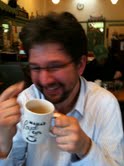
I’ve been wanting to write a story about seizure dogs for years, ever since I heard about their ability to sense the onset of epileptic seizures before their masters have any idea that they are going to seize. There’s so little documented material, though, that I kept putting off the story. So I was surprised and fascinated (panicked, actually) to see
a piece about dog intelligence in the Sunday
NYT that opens with tell of Jet, a seizure dog in New Jersey that, among other amazing talents, puts its body in a position on the floor to break the seizure fall of his master before she even knows she’s going to have one.
The
Times piece, by Sarah Kershaw, acknowledges that there is still “mystery” about how dogs can detect seizures before they occur, but it fails to look skeptically at whether the dogs are really able to predict--in a way that no neurologists can—when a seizure is going to occur.
The piece goes on, credulously, I think, to cite “Hungarian researchers [who] reported in a study last year that a guide dog for a blind and epileptic person became anxious before its master suffered a seizure and was taught to bark and lick the owner’s face and upper arm when it detected an onset, three to five minutes before the seizure.” The dog not only “knows more than we thought,” he knows more than any neurologist I’ve ever met or heard of and is more sensitive to the subtle electrical happening in the brain before a seizure than any fMRI or EEG. As explanation for this amazing feat of prediction, Kenshaw suggests, maybe that the dog may be “picking up on behavioral changes or smelling something awry.”
I hate to throw a wet, skeptical blanket on dog lovers, romantics, and telepathy fans, but there might be another, and really fascinating and important, explanation for how the Hungarian dog knows that seizures are coming. I think the dog can predict seizures because its predictions bring them on.
I know how crazy that sounds. But consider this fact, which blew my mind when I read it earlier this year: tens of thousands, possibly hundreds of thousands, of Americans who are diagnosed with uncontrolled epilepsy do not have epilepsy at all. They have real seizures all right, and those seizures look like epileptic seizures, but they aren’t caused by uncontrolled electrical activity in their brains, like epileptic seizures are. Rather, they are what neurologists call “psychogenic non-epileptic seizures,” or PNES, which can only be definitively diagnosed using video-monitored EEG. The patient is hooked up to an EEG, which monitors the electrical activity in his or her brain, and is also video taped so that the seizure behavior can be compared to the EEG. The patients are in no way putting on a show; they fully believe they have epilepsy and generally accept diagnosis and treatment when the real roots of their seizures are exposed.
Here’s the thing, patients with PNES tend to be highly suggestible. When they are told, in an epilepsy clinic, while attached to an EEG and while being videotaped, that a seizure will be provoked, say, by flashing lights, or the administration of a saline solution, the procedures
do tend to bring on PNES-type seizures. Such strategies do not tend to catalyze epileptic seizures. The PNES patients, whose seizures have psychological rather than neurological roots, follow the lead of their examiners and can often be fairly easily “guided” toward seizing.
Here’s the
Freakanomics moment: Undoubtedly, some of the seizure-dog-owning patients who believe they have epilepsy are actually suffering from PNES. And these very suggestible patients could well be seizing in
response to their dog's behavior. When that Hungarian dog starts to lick his master’s forearm, warning her that she is going to have a seizure, that suggestion could well be enough to induce a psychogenic seizure. The dog and the patient are engaging in a kind of
folie à deux.
All you’d need to trash this hypothesis is one patient whose seizure dog could be proved to reliably predict real epileptic seizures, as opposed to apparently-epileptic-but-actually-psychogenic ones. If my hunch is right, though, and I have a hunch it is, it would certainly behoove anyone with a working seizure dog who they think
can predict the future, to get themselves to an epilepsy clinic for a video EEG to see if the root of their seizures might be something other than epilepsy. Psychogenic seizures are treatable, but not with anti-seizure medications. And if you are unnecessarily suffering the side-effects and expenses of treatment for epilepsy, but don’t have it, that would be very, very good to know.
I’m not opposed to researching miracle dogs that can smell seizures that haven’t happened, though I’d rather not have to pay for it. But if I’m right, the research projects worth spending real money on are those that would lead to an understanding of how PNES works and how better to better treat it.
------------------------
Illustration by Ross Macdonald, from NYT, Oct. 31, 2009





